#live action review
Explore tagged Tumblr posts
Text
Johnny Sokko And His Flying Robot 1967 Episode 25 Review
The Poshest French Musketeer Vampire Ever!On paper, in Manga format, I’m sure this story actually worked… Maybe. But it just falls apart in love action. All things considered. A UNICORN Agent in random driving around patrol is lured into a shrine of some village by a woman. Who turns out to be… A badly done vampire. Really? They could have bought better prop gangs from a novelty store for…
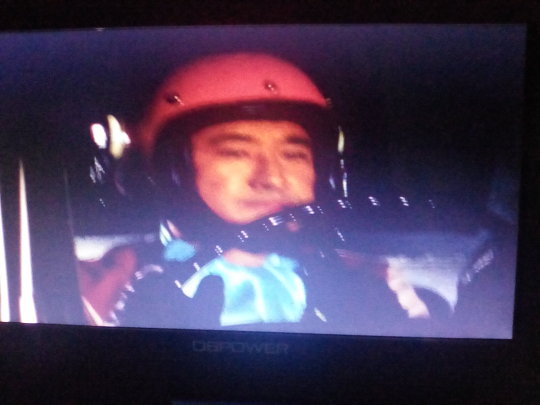
View On WordPress
#1967#American International#Giant Robo#Japanese Tokusatsu Review#Johnny Sokko And His Flying Robot#Live Action Review#Shout Factory#Toei Pictures
0 notes
Text

Missing him...
#zuko#atla#my boy... my baby boy...#i saw 2 fan arts of him and went HHHHHHH#oh and all inknow about the live action are from reviews#so theres that
2K notes
·
View notes
Text
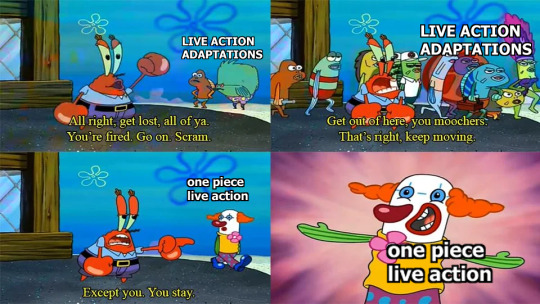
#when we thought the atla MIGHT be ok after opla but it turns out opla is just an exception#HS9D8FUIPJLK#annie rambles#opla#one piece#avatar the last airbender#ive heard mixed reviews about the atla live action but the consensus feels like the writers werent in tune with the source enough#where opla it really feels like the writers understand op at its core so thus were able to transform it#but maybe thats just me#80U9DSFPOJKL#i have so many thoughts on how much i liked opla i should make a separate post but like. for one not disrespecting source by#saying that the new take is ''more for adults" or whatever / all that nonsense#and again just respecting source material feels like a major difference here
2K notes
·
View notes
Text
[REVIEW] "One Piece" Live Action (2023):
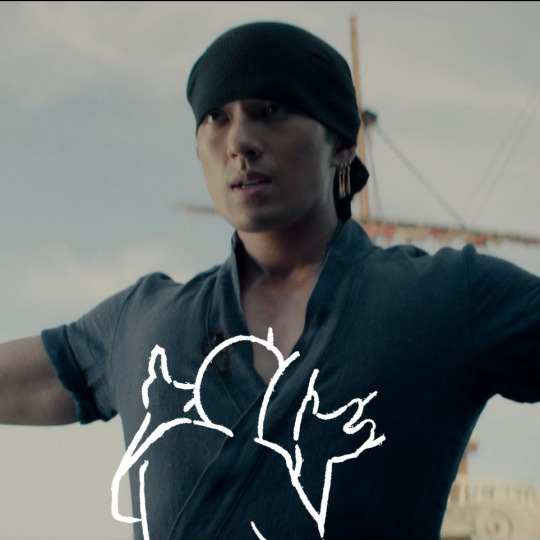
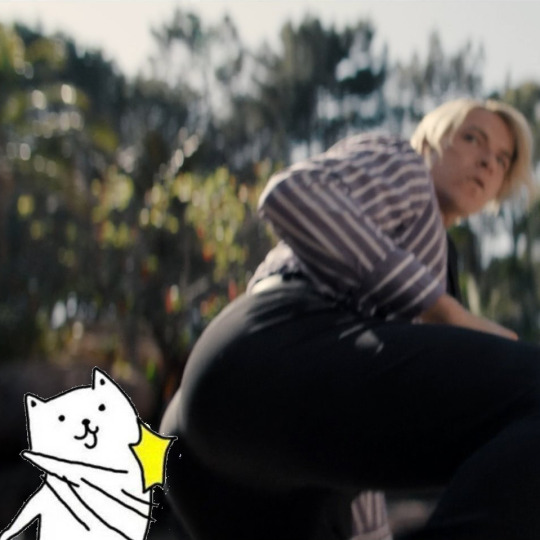
#One Piece#One Piece Live Action#One Piece Netflix#OPLA#Roronoa Zoro#Vinsmoke Sanji#Zoro#Sanji#ZoSan#Arata Mackenyu#Mackenyu#Taz Skylar#that's it#that's the review
5K notes
·
View notes
Text
So, uh, Netflix Avatar, huh? Yeah. I guess I'll make a really long post about it because ATLA brainrot has is a cornerstone of my personality at this point.
So.
It's okay. B, maybe a C+.
That's it.
Now for the spoilers:
The biggest issue with the Netflix version is the pacing. Scenes come out of nowhere and many of the episodes are disjointed. Example: Aang escaping from Zuko's ship. We see him getting the key and going "aha!", and in the next scene he's in Zuko's room. And then he just runs out, no fun acrobatics or fights, and immediately they go to the Southern Air Temple where he sees Gyatso's corpse, goes into the Avatar state, and then sees Gyatso being really cheesy, comes out of it, and resolves that conflict. Nothing seems to lead into anything. The characters don't get to breathe.
The show's worst mistake (aside from Iroh fucking murdering Zhao) is its' first one: they start in the past. Instead of immediately introducing us to our main characters and dropping us into a world where we have a perfect dynamic where Aang doesn't know the current state of the world and Katara and Sokka don't know about the past, thus allowing for seamless and organic worldbuilding and exposition, they just... tell us. "Hey, this is what happened, ok, time for Aang!" There's no mystery, no intrigue, just a stream of information being shoved down the audience's throats and then onto the next set piece.
The visuals are for the most part great, but like with most Netflix productions, they just don't have great art direction. It feels like a video game cinematic, where everything is meant to be Maximum Cool - and none of the environments get to breathe. It's like they have tight indoor sets (with some great set design) and then they have a bunch of trailer shots. It's oozing with a kind of very superficial love.
Netflix still doesn't know how to do lighting, and with how disjointed the scenes are, the locations end up feeling like a parade of sets rather than actual cities or forests or temples. As for the costumes, Netflix still doesn't know how to do costumes that look like they're meant to be actually worn, so many of the characters seem weirdly uncomfortable, like they're afraid of creasing their pristine costumes.
The acting is decent to good, for the most part. I can't tell if the weaker moments come down to the actors or the direction and editing, but if I had to guess, I'd say the latter. Iroh and Katara are the weakest, Sokka is the most consistent, Zuko hits the mark most of the time, and Aang is okay. I liked Suki (though... she was weirdly horny? Like?) but Yue just fell kind of flat.
The tight fight choreography of the original is replaced with a bunch of spinny moves and Marvel fighting, though there are some moments of good choreography, like the Agni Kai between Ozai and Zuko (there's a million things I could say about how bad it was thematically, but this post is overly long already.) There's an actually hilarious moment in the first episode when Zuko is shooting down Aang, and he does jazz hands to charge up his attack.
Then there's the characters. Everybody feels very static - Zuko especially gets to have very little agency. A great example of that is the scene in which Iroh tells Lieutenant Jee the story of Zuko's scar.
In the original, it's a very intimate affair, and he doesn't lead the crew into any conclusions. Here, Iroh straight up tells the crew "you are the 41st, he saved your lives" and then the crew shows Zuko some love. A nice moment, but it feels unearned, when contrasted with the perfection of The Storm. In The Storm, Zuko's words and actions directly contradict each other, and Iroh's story gives the crew (and the audience) context as to why, which makes Zuko a compelling character. We get to piece it out along with them. Here - Iroh just flat out says it. He just says it, multiple times, to hammer in the point that hey, Zuko is Good Actually.
And then there's Iroh. You remember the kindly but powerful man who you can see gently nudging Zuko to his own conclusions? No, he's a pretty insecure dude who just tells Zuko that his daddy doesn't love him a lot and then he kills Zhao. Yeah. Iroh just plain kills Zhao dead. Why?
Iroh's characterization also makes Zuko come off as dumb - not just clueless and deluded, no, actually stupid. He constantly gets told that Iroh loves him and his dad doesn't, and he doesn't have any good answers for that, so he just... keeps on keeping on, I guess? This version of Zuko isn't conflicted and willfully ignorant like the OG, he's just... kind of stupid. He's not very compelling.
In the original, Zuko is well aware of Azula's status as the golden child. It motivates him - he twists it around to mean that he, through constant struggle, can become even stronger than her, than anyone. Here, Zhao tells him that "no, ur dad likes her better tee hee" and it's presented as some kind of a revelation. And then Iroh kills Zhao. I'm sorry I keep bringing that up, but it's just such an unforgiveable thematic fuckup that I have to. In the original, Zhao falls victim to his hubris, and Zuko gets to demonstrate his underlying compassion and nobility when he offers his hand to Zhao. Then we get some ambiguity in Zhao: does he refuse Zuko's hand because of his pride, or is it his final honorable action to not drag Zuko down with him? A mix of both? It's a great ending to his character. Here, he tries to backstab Zuko and then Iroh, who just sort of stood off to the side for five minutes, goes "oh well, it's murderin' time :)"
They mess with the worldbuilding in ways that didn't really need to be messed with. The Ice Moon "brings the spirit world and the mortal world closer together"? Give me a break. That's something you made up, as opposed to the millenia of cultural relevance that the Solstice has. That's bad, guys. You replaced something real with something you just hastily made up. There's a lot of that. We DID NOT need any backstory for Koh, for one. And Katara and Sokka certainly didn't need to be captured by Koh. I could go on and on, but again, this post is already way too long.
It's, um, very disappointing. A lot of telling and not very much showing, and I feel like all of the characters just... sort of end up in the same place they started out in. I feel like we don't see any of the characters grow: they're just told over and over again how they need to grow and what they need to do.
To sum it up: Netflix Avatar is a mile wide, but an inch deep.
#avatar the last airbender#atla#atla spoilers#avatar netflix#netflix avatar#atla live action#netflix atla#zuko#iroh#katara#aang#sokka#zhao#ozai#review
2K notes
·
View notes
Text
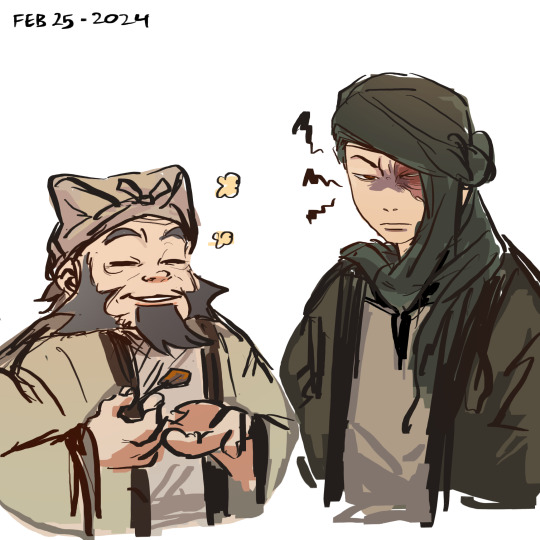
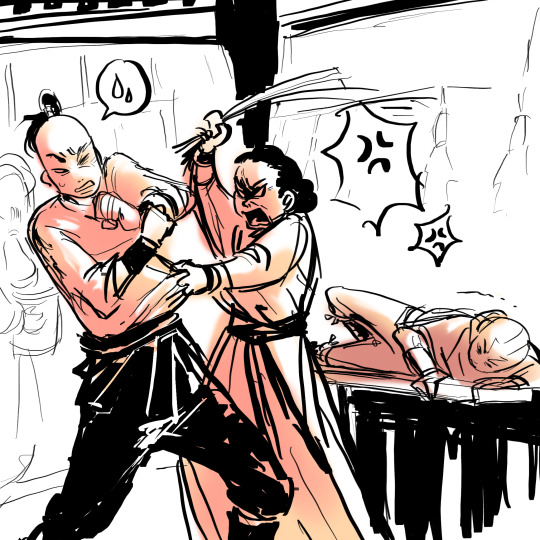
Just started watching the Netflix ATLA live action (currently on the third ep!) and I especially love the lil hat Iroh got to wear, decided to draw them with the og art designs :]]
Also really loved the scene with the woman who defends Aang by scolding Zuko mid-fight 😭 She’s the realest auntie
I just try to imagine the whole live action as a super high budget ATLA au. My sister does a better job at it though lmao. BUT it is entertaining! The dialogue is so funny sometimes with how odd it sounds, and Aang’s actor is so adorable.
My thoughts are blasting at random so do bear with me. While watching I was telling my sister that it’s a fun live action but as much as I try not to compare it too much to the og show, I just don’t enjoy live actions very much in general. I will admit that “real gritty dark” live actions do tend to attract more people, so if anything I’m glad that at least it will invite people to the wonderful story that is ATLA, and maybe even get them to watch the original :]
Would love to hear your thoughts though because from what I’m seeing its a very defined 50-50 split between people who loved and it people who absolutely despise it 💀
#atla#atla fanart#atla live action#atla netflix#atla zuko#atla aang#uncle iroh#aang#zuko#prince zuko#avatar the last airbender#netflix atla#natla#seeing so many mixed reviews lol but i be enjoying it regardless#anything for more atla content#waiting on the future animations to come from avatar studios#so excited#my atla art
2K notes
·
View notes
Text
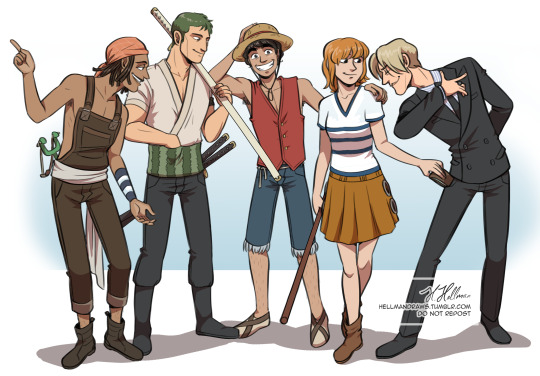
Not gonna lie, I'm super excited about the upcoming One Piece live action series! It's out Aug 31 on Netflix. I actually think it's gonna be good! 🤞🤞🤞
#reminder that the strike has NOT called for a boycott from viewers!#we want to show that we want more of this show and that Netflix has to pay their writers properly if they want to keep profiting from it#don't forget: the continuation of a popular show is a bargaining chip for the writers#one piece#one piece live action#monkey d. luffy#roronoa zoro#nami#usopp#sanji#when I first heard about the LA years ago I thought they were crazy#manga live actions are never good and OP is basically unfilmable#but when the strawhat cast was revealed I sat up straight and started paying attention#they were all spot on! absolutely unheard of in a live action!#and everything I've seen and heard about it since has just seemed so promising#early reviews are starting to come out and they're all positive#guys I think they did it#I think... Netflix actually made a good live action adaptation??#and of OP of all thing?!?!#(I won't be able to watch it until Sunday though so I'm gonna have to stay off the internet completely to avoid spoilers! TAT)
2K notes
·
View notes
Text
This Week in BL - Boyfriend Era is a Go
Organized, in each category, with ones I'm enjoying most at the top.
NOV 2024 Week 2
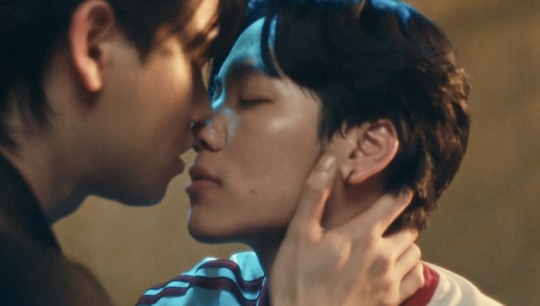
Ongoing Series - Thai
Jack & Joker (Thai Mon IQIYI) ep 9 of 12 - I have to say it, the heist stuff is stupid and all the sidekicks are idiots to the point of annoyance. But Yin and War are truly stellar at these parts. And in general in these roles. Can’t knock 'em. It’s been a year of some very good kisses and this has to have been the best. So this show is top of the standings this week for that kiss alone. Like srs boys? I mean to say, BOYS! How dare. Breaking the internet like that.
Honestly, let's be clear, these two have had killer chemistry since the En of Love and we all expected great things. And now, here we sit, suffering great things from these kings. Thank you, Sirs, may we have another?
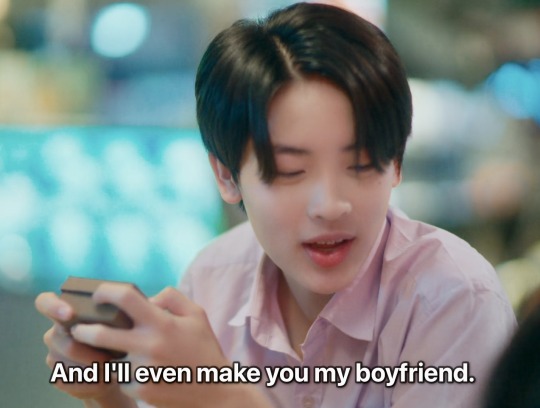
Love Sick 2024 (Thai Sun iQIYI) ep 8 of 15 - I'm chronicling my experience with 2024 as compared to 2014 here. The Per Win story arc never interested me in 2014 and I’m not enjoying it now either. But Mick and Ohm are better in 2024. Nong Mick is a standout character, and a brilliant glow up in this version and he’s a confident little shit (affectionate). The mains are good too, but Phun and Noh always were great characters, and these actors are quite good. Possibly better than the original.
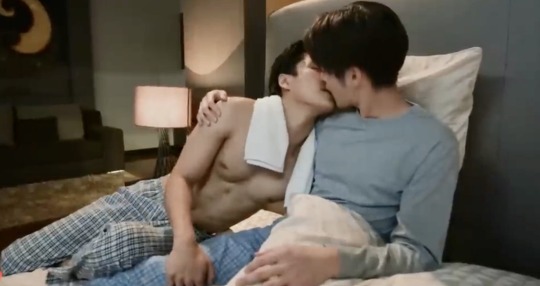
Kidnap (Fri YT) ep 10 of 12 - More bf era delightful diabetes. They are the best boyfriends and the cutest family in the entire world. No exceptions. Next week is definitely doom tho.
Every You Every Me (Thai Mon Gaga) ep 5 of 10 - Talk about making consent and communication sexy! *fans self* Whoah! That was unexpectedly great. The blatancy of the lust in this one was fun too. And the general casual switch nature of the relationship = delightful.
I like the little acting course we're getting from these tw. They are both quite good. I’m not sure I really enjoy the stories that they’re telling, but I do like how they are telling them.
Fourever You (Thai Thurs YT) ep 6 of 16 - Hill is the premier torch carrier of this year. My goodness. He sure nursed that crush. While I really like this main couple, I’m happy to have some of the others start to creep into the narrative at this juncture. Alone HillTer are a bit intentionally miscommunicative and saccharine. But the screen-time distribution amongst couples seems a little strange. That said, couple 2? No thank you. I really don't like North as a character at all. I find him incredibly unappealing. Ordinarily I'd be on his side because....... blackmail trope renders Johan automatically a complete arse. But at least this is 2 unlikable characters being jerks to each other?
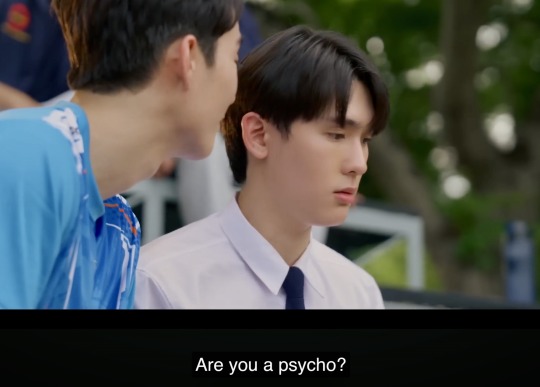
Perfect 10 Liners (Thai Sun YouTube?) ep 2 of 24 - Say it with me Thailand: negging is NOT romantic. Frankly, Arc is just an asshole and a bully with anger issues. But…… Yay cute sides! PondSand they funny. (Book, to me = never very funny. I don’t think comedy is his bailiwick. Look, comedy is HARD ya’ll and usually not in that way.)
Ongoing Series - Not Thai
Our Youth AKA Miseinen: Mijukuna Oretachi wa Bukiyo ni Shinkochu (Japan Tues Gaga) ep 1 of 11 - They’re doing some interesting stuff with the framing (both filming style and narrative) that makes this extremely old-fashioned feeling (like Takumi-kun level). I keep saying that this year, but it feels like BL is doing a lot of rediscovering its roots right now. This one even had a goldfish. And abuse. (The two, oddly, often go hand-in-hand in JBL ) And overall...... it’s a bit weird. Which I don’t mind from Japan. Japanese BL can get weird in a good way. Oh I like it. Bully meats smart loaner, total opposites attract, both are lonely and broken and NEED each other, and all that.
See Your Love (Taiwan Weds Gaga) ep 4 of 13 - Oh dear, our poor little rich boy is very broken indeed. The sides are utterly ridiculous.
My Damn Business (Korea Sat YT) eps 6 of 7 - I don’t normally like a love triangle, but I kind of like this one since it gave our uke a bit more depth and agency. And charm, quite frankly. So far he’s been a very dower character.
Eccentric Romance (Korea Weds Viki) eps 9-10 of 12 - Okay boyfriend era is a go. Goodness but they sure are adorable.
Teenager Judge (Vietnam Sat YT) ep 7 of ? - The slow burn is really very slow. To the point of frustration. But I'm still enjoying the show, just not as much as I was.

Love is Like a Poison AKA Doku Koi: Doku mo Sugireba Koi to Naru (Japan Tues Netflix?) 8 of 10 eps - Even Japan is going through a bf era rn I see. How unusual.
Love in the Air: Koi no Yokan (Japan Sat Gaga) ep 2 of 10 - I’m slightly less annoyed by this one than the original (but I was VERY annoyed by that). I think mame is being tempered by a few things:
There’s so much less time spent on the back-and-forth, because this is a much shorter show, so I have less time to be frustrated by it and the utter uselessness of 75% of these characters.
Also, there's that innate Japanese awkwardness of portrayal & social interaction, which makes the unpleasantness of the characters' behavior and touch more understandable.
This, in turn, is married to the natural kink factor of JBL.
There’s a clearer Dom sub from the get go with this version, makes the blackmailing a little bit more tolerable because it's clearly Play. (negotiated or not) Simply put, daddy wants his brat to beg. And honestly? So say we all.
On a completely different note, the wardrobe for this show is terrible. Like truly bad BAD.
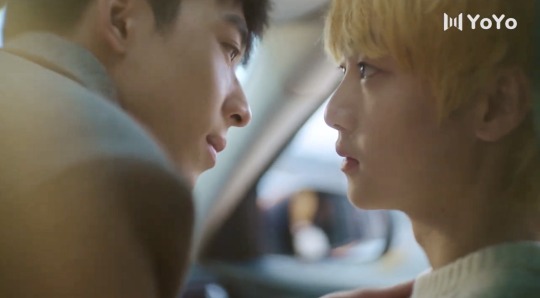
Blue Canvas of Youthful Days (China Sun iQIYI) eps 3-4 - Well I guess that’s that disability dealt with. Meanwhile, competitive bullying art students? I am very amused. Zoo date was cute. This is unquestionably a BL (I’m even more scared now). Still, the gay boys dealing with the straight dude’s crush was truly hilarious. So much "our gay drama doesn’t have time for your het bullshit." Classy move, I smell some Taiwan in this show.

Let Free the Curse of Taekwondo (Korea Thurs Gaga) eps 4-8 end - I was reliably informed this has an HFN end so I decided to watch. Noble and self sacrificing with both of them taking the blame.
My thoughts are...... mixed.
High school student Do Hoe lives with his brutal father who runs a Taekwondo gym. When cheerful Ju Young arrives to train, they fall in love. An unexpected incident forces them apart, they reunite over a decade years later. Essentially this is a brilliant narrative about finding love at the worst possible time, surviving chronic abuse, and the way we process mental, emotional, and physical trauma overtime. Yes it’s also a romance, but that’s not primarily what this story is actually about. I can recognize its genius, but this type of narrative is not for me. I’m reminded of bittersweet painful shows like To My Star 2, or The On1y One, or even Not Me. Is this BL tangential or is it some other genre entirely? Am I questioning my own taste because I did not like its content, or because I do not like its genre? And if it’s not BL should I even render judgment? I think I have to lean into the way I approached some of those other shows, which is to say: it is not for me but I recognize that it is of an extremely high-quality that is certainly for someone else.
Recommended, but only if you like masochistic cinema. Under those circumstances 9/10
(but know that if i were rating for my personal taste? 7/10 I’m never re-watching this, and there is a small part of me that wishes I never had)

It's airing but......
Love for Loves Sake got some kind of special supposed to air 11/9. Not sure what, why, or where. Only the rumor that it...... is. I'll believe it when I see it...... literally.
The Hidden Moon (Sat WeTV) 10 eps - I've been reliably told not to bother, so I won't.
Bad Guy My Boss (Thai Sun Gaga) 10 eps - I DNF'd at ep 7, I couldn't make it. I am weak. Life is hard enough right now, this show is making it harder. It’s not what I want from my entertainment.
Bad to Bed (Taiwan Sat YouTube) 10 eps - This is a little too low production value even for me. And just very very odd. DNF

In case you missed it
Uncle Unknown finished its run on YT. Censored Chinese BL with paralytically bad production levels. But certainly BL. Boys reunite after a break up only to discover one of them is the step-Uncle of the other. Much to my own shock and surprise I watched all 12 episodes of this. Fortunately, each episode is about 5 minutes long. Under those circumstances is it worth it? Maybe. It’s bad. But not offensive. So that's a win. And you know me, I love a weird take on the stepbrother’s trope and incest taboos. 5/20 watch it only if you have nothing better to do
Next Week Looks Like This:

Gosh there's a lot on right now.
Upcoming BLs for 2024 are listed here. This list is not kept updated, so please leave a comment if you know something new or RP with additions.
November BL:
11/15 Caged Again (Thai Fri Gaga) 10 eps - Penguin escapes zoo by turning into a human. Gets trapped again and a panther falls in love with him.
11/17 Your Sky (Thai Sun iQIYI) 12 eps - A naive freshman and the campus’s popular senior agree to pretend to be a couple - but their fake deal begins to generate real feelings.
11/20 Winter Is Not The Death of Summer (Thai Weds YT) ?? eps - Criminals who meet in prison fall in love
11/20 The Heart Killers (Thai Weds YT iQIYI) 12 eps - Jojo directs FirstKhao & JoongDunk in an action romcom about assassin brothers (Khao & Joong) who meet a tattoo artist ex-booster (First) and a mechanic (Dunk). I'm highly amused that Joong plays the older brother to Khao and that we have a take on the Taming of the ShrewBL. I like that everyone is morally gray. This has all GMMTV's best chemistry in one BL and some fresh concepts that I've only seen tackled in m/m romance novels (check out Amy Lane's Racing for the Sun, thank me later). I'm excited. My only quibble is Jojo, I like his style but his characters can get unreliably messy so…... this gonna be interesting.
THIS WEEK’S BEST MOMENTS
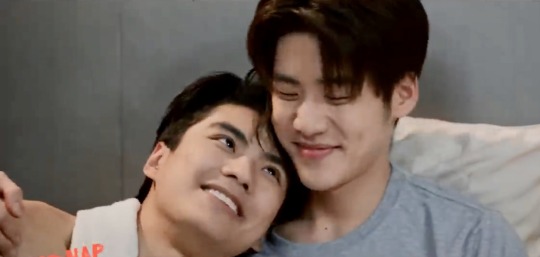
The insane level of his babygirl heart eyes.
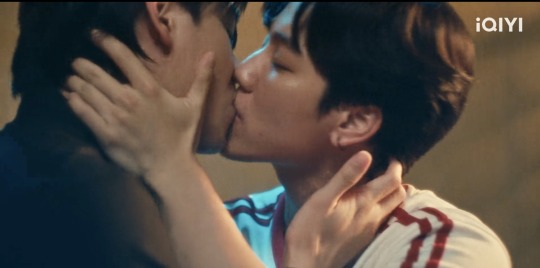
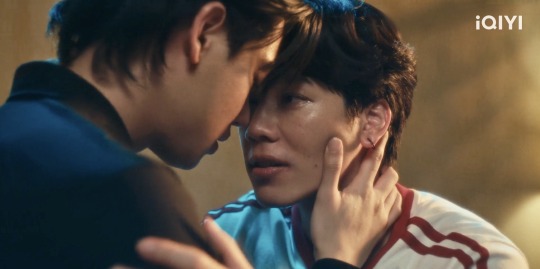
Just, have mercy.
(last week)
The tag BLigade: @doorajar @solitaryandwandering @my-rose-tinted-glasses @babymbbatinygirl @babymbbatinygirl @isisanna-blog @mmastertheone @pickletrip @aliceisathome @urikawa-miyuki @tokillamonger @sunflower-positiiivity @rocketturtle4 @blglplus @anythinggoesintheshire @everlightly @renafire @mestizashinrin @bl-bam-beyond @small-dark-and-delicious @saezurumurmurs
#this week in BL#BL updates#Jack & Joker#Jack and Joker#fourever you#Perfect 10 Liners#Eccentric Romance#Teenager Judge#Kidnap the series#Love Sick 2024#Love in the Air Koi no Yokan#Love in the Air Japan#Every You Every Me#My Damn Business#Blue Canvas of Youthful Days#Love is Like a Poison#Doku Koi: Doku mo Sugireba Koi to Naru#Our Youth#Miseinen Mijukuna Oretachi wa Bukiyo ni Shinkochu#uncle unknown review#Let Free the Curse of Taekwondo review#upcoming BL#BL news#BL reviews#BL gossip#Thai BL#Vietnamese BL#Japanese BL#live action yaoi#Koren BL
165 notes
·
View notes
Text
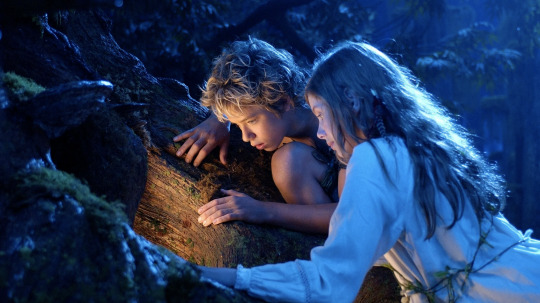
P.J.Hogan's 'Peter Pan' is still an underrated masterpiece 20 years later
Peter Pan is a live-action fantasy adventure film directed by P. J. Hogan that reimagines the classic story of Peter and Wendy. The screenplay was written by P. J. Hogan and Michael Goldenberg and was released in cinemas in December 2003. The screenplay is based on the 1904 play Peter Pan, or The Boy Who Wouldn’t Grow Upand the classic novel Peter Pan by J.M.Barrie, which was originally published under the title Peter and Wendy.
The film tells the story of a young Edwardian girl, Wendy Darling (Rachel Hurd-Wood) and her two younger brothers John and Michael. On the night she is told she must grow up, a wild, fairy-like boy called Peter Pan (Jeremy Sumpter) flies into her room with his high-maintenance fairy Tinkerbell. When he learns that she tells stories, he whisks Wendy and her two brothers away to a magical Island called Neverland — where you supposedly don’t “grow up” — so that she can mother his henchmen, the Lost Boys. There she fights pirates led by the evil Captain Hook (Jason Isaacs), meets mermaids, dances with fairies, falls in love and grows up.

I have strong family connections tied to Peter and Wendy and J.M.Barrie. My great, great uncle Nico was one of the sons of Sylvia Llewelyn Davies'. He and his other brothers "the Lost Boys" were adopted by J.M.Barrie; which ultimately inspired him to write Peter Pan. Nico’s daughter Laura — my cousin — who I met for the first time a few years ago, told me that she was flown to Australia for the filming of P.J. Hogan’s Peter Pan because she was J.M.Barrie’s goddaughter. She told me that she was thrilled with the cast, especially Jason Isaacs, who played Captain Hook and Mr Darling. She also mentioned that Jeremy Sumpter, who played Peter Pan, was a lovely boy. However, she said she was very surprised and sad that the film wasn’t a big success as she really liked what they did with the story. I have loved the fairytale of Peter Pan from a young age, and learning that I am literally part of the family that inspired the story was very exciting and I’ve only begun to internalise it more as I’ve grown older.
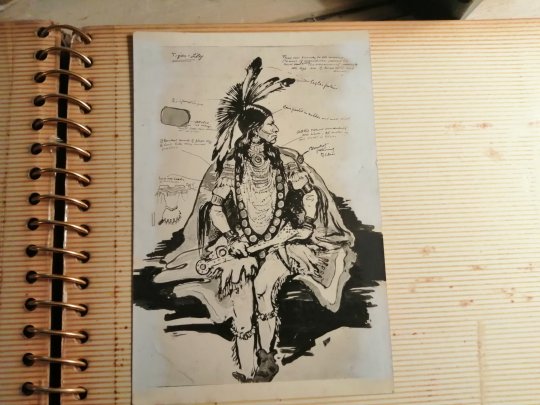
When I was in my mid-twenties, I was diagnosed with a high level of Autism. One of my main symptoms was labelled “ageless”, which in simple terms means that one half of me is still a child that I can’t mentally leave behind. I can’t do many things that most adults can do, such as pay bills, drive a car, look after my own well being etc. I flap my hands when I get excited. I bounce. I sometimes speak in a baby voice. I overcommit to things I enjoy. I admit that it was hard to come to terms with the diagnosis when I first received it. But over time, I’ve come to believe that the two can coexist in a healthy way. I believe that I am an adult who is able to develop and grow while still carrying the child within me, and that this is not seen as a bad thing. I think Peter and Wendy can be seen as a reflection of that.

I was first introduced to P.J. Hogan’s Peter Pan a few years after it was released (I was maybe nine or ten years old), and I absolutely loved it. It wasn’t only one of my favourite film adaptations, but one of my favourite movies of all time. What surprised me most about the film at that age was how dark and gruesome it was, and full of this underlying sexual tension that I hadn’t expected at all from Peter Pan. Even today, this film still has a special place in my heart. It is made with so much passion and love for the original text that I can automatically put myself back into the story. After watching the film again as an adult, I almost immediately opened my copy of Peter and Wendy and started reading. I would even go so far as to say that I prefer the film to the book. However, part of me wishes that the age rating had been set much higher, as the dark and gruesome moments were some of the strongest parts of the film adaptation. This is possibly why some critics and viewers had difficulty categorising the film at the time.
However, I often consider P.J.Hogan’s Peter Pan to be the same equivalent as Joe Wright’s Pride and Prejudice. (which came out a few years later in 2005, starring Keira Knightley and Matthew Macfadyen). The film moves at the same dreamlike pace. It is light, dark, colourful and deeply romantic.

I also often prefer P.J.Hogan’s Peter Pan to the 1953 Disney Animation of the same name, even though it’s the version I grew up with and liked. I find it much less straightforward and innocent. Also, the 2003 film is much closer to the original source material, which I loved reading as a teenager, and to J.M.Barrie’s original vision. The film manages to reflect the same intellectual subtext and depth of the novel while retaining the whimsy and magic.
Magical Realism

Peter Pan was a perfect blend of fantasy and realism. A lot of media these days focus too much on “realism” and make their sets and CGI look bland and washed out. It’s a common myth these days that no one likes whimsy anymore; it’s somehow seen as too childish. As a result, much of the magic of fantasy is lost. But in this Peter Pan, a lot of colour was used in the set design and cinematography. Everything was so brightly and colourfully lit. Most fantasy films these days, including the new live-action adaptation of Peter Pan and Wendy on Disney+, are all so gloomy and dark. You almost have to light up the screen to make out the actors’ facial expressions or what’s happening in the scene. But this film understands that a viewer who watches fantasy wants to be swept away, but also wants a certain amount of believability. Although the film contained a good amount of darkness, it did not shy away from being cartoonish either (which I think was partly inspired by the Disney animation), i.e. characters blushing or bouncing on the clouds.
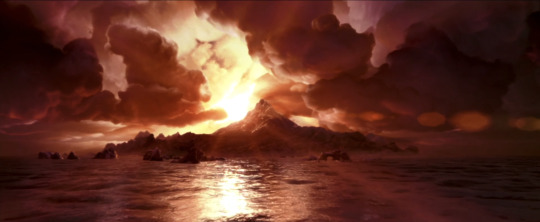
The design of Neverland was breathtaking. I think the CGI, although criticised by some, made the island and creatures look more dreamy and fairytale-like. It was a good combination of CGI for the landscapes and real backdrops for the jungle, so there was enough magic and believability to transport the viewer into the story. A bright colour palette was used for the landscapes, while down-to-earth colours such as browns and greens were used on the ground, such as in “The Lost Boys Hide” under the tree, to give a sense of realism. The costume department also reflected this, from the majestic reds and blacks of the pirates, to the earthly colours of blue and red for the Native Americans, to the natural greens and browns of the Lost boys. I noticed that the colours in Neverland were used as a contrast to the Edwardian London back home, which is realistic but dull compared to the island.
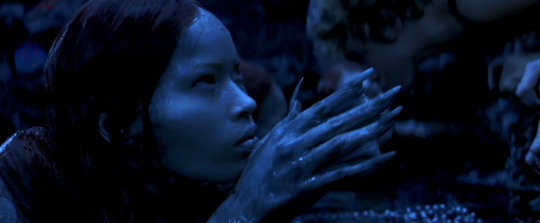
One aspect I liked was that the lighting on Neverland always changed depending on the mood of the scene- unlike the naturalistic lighting on Earth. It was almost as if the island was a living being. For example, when there was a fight on the ship, the lighting was red. When Peter took Wendy to the mermaids, who were scary and frightening, the lighting was dark and blue. This created a surrealistic atmosphere, almost like a fever dream or a kind of nightmare.
Sometimes the environment changed depending on Peter Pan’s mood in the respective scene. I particularly liked how Peter Pan influenced the weather on Neverland. Just his mere presence when he flew to the island changed the entire atmosphere in an instant. His feelings also determined whether it was summer or winter. In other words, its suggested in the film that the longer he has been there, the more the island has become a part of him, so that he can no longer leave it. It’s almost as if the island has transformed him into a magical being.
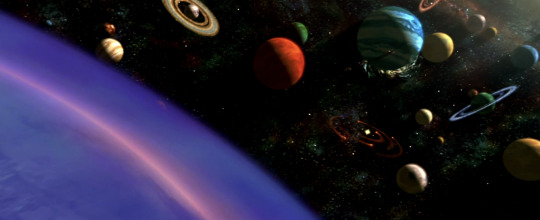
The exuberant musical score by James Newton Howard: I’ll never forget that. I think that was one of the first movies I saw where I actively noticed the music because it was so brilliant. Even today, the “Flying” soundtrack still gives me goosebumps. It perfectly encapsulates the whimsy, joy and imagination of Peter and Wendy. I loved that there were always different variations. One of my favourite pieces from the movie is ‘Fairy Dance’, which starts off cheerfully and moves up and down depending on the characters’ conflict/what they’re saying in the scene.
Cast
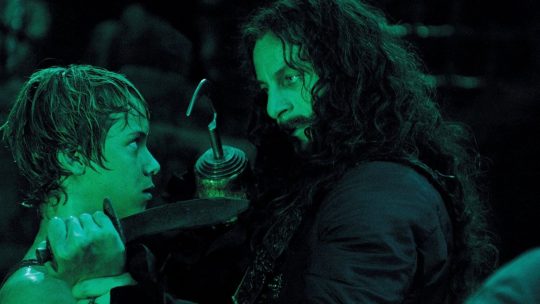
The cast of this film adaptation was magnificent. The look of all the actors not only matched the book description, but also the mood, especially with the Darling family. One of the standouts was Olivia Williams as Mrs Darling. She captured the gentleness of the character perfectly. I also loved the new addition of Aunt Millicent, played by Lynn Redgrave. She fitted into the story so well that I was surprised not to find her in the novel. She had the perfect amount of ridiculousness and hilarity that suited J.M.Barrie’s style.
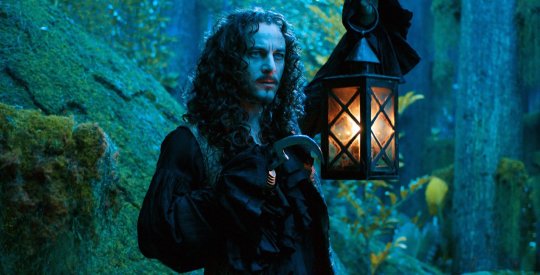
One particular member of the cast we can probably all agree on that was perfect, was Jason Isaacs, who played both Wendy’s father Mr Darling and Captain Hook. He was certainly a star in this film for sure. I just can not think of anyone who could play him better, especially in a live-action film adaptation. He was particularly good in the role of Captain Hook. When I first saw the film as a child, I did not know that Captain Hook and Mr Darling were played by the same person until my dad pointed it out to me because he was so good. I loved how they portrayed Wendy’s dad as shy and reserved, as opposed to Captain Hook who was flamboyant and sinister. Mirror versions of each other in different realities — that’s a common theme throughout the film. As Captain Hook, Jason Isaacs perfectly captured the essence of viciousness, deviousness and brutality that was necessary for the character. But also the deep loneliness and frustration behind it all. I have seen a quote that was supposedly cut from the film (and never should have been) that provides so much context for his hatred of Peter Pan:
“Imagine a lion in a cage and into that cage flies a butterfly. If the lion was free, it would pay no heed to such creature. But the lion is not free…and so the butterfly drives him slowly insane.” — Captain Hook
They did a really good job of showing how Peter Pan and Captain Hook are mirror images of each other. Peter Pan is a child who secretly wants to be an adult, while Captain Hook is an adult who secretly wants to be a child. Both fight each other for different reasons, but the goal is the same. For example, there is a great scene towards the end where Captain Hook uses his wits to defeat Peter in a fight. Here it becomes clear that there is deep symbolism for the inevitability of adulthood and the loss of childhood. Jason Isaacs really showed off his acting talent here. I liked that he wasn’t portrayed as a “dumb villain”, which he easily could have been.
There were also some great performances among the adults. Most notable was Richard Briers as the ‘pirate’’ Smee. But the child actors, especially the lost boys, really held the movie together. Their solid performances made it so believable that the island was ruled by children. I loved Theodore Chester as Slightly. He was very charming and funny in that role.
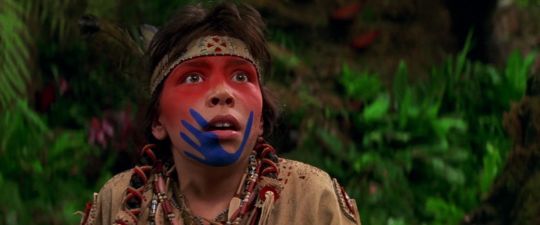
Another member of the cast I thought was brilliant was Carsen Grey, an indigenous actress of Haida descent, who played Princess Tiger Lily. I liked that they let her speak her ancestral language, Mohican, in this film. Although this film came out in the early 2000s, it is the only version of Peter and Wendy in which Native Americans are neither erased nor white-washed even though the representation is far from great. Considering how they’re treated in the novel, it’s perhaps for the best overall that they limited some of their scenes. However, I liked how firey she was in this adaptation and not the damsel in distress she was portrayed as in the Disney animation. I think it was a wise decision to cut the infatuation she had with Peter Pan, as it was really just one line in the book that would have added unnecessary drama, and all in all, it would have fallen short if all the female characters were jealous of each other.
They also downplayed Tinkerbell’s jealousy in this regard, portraying it more as her trying to protect Peter Pan’s youth from romantic advances, as hinted at in the novel, and also being sad that Wendy is attracting all of Peter Pan’s attention. Ludivine Sagnier has, in my opinion, succeeded well in making Tinkerbell equally repulsive and endearing, as befits the character.
Wendy Darling
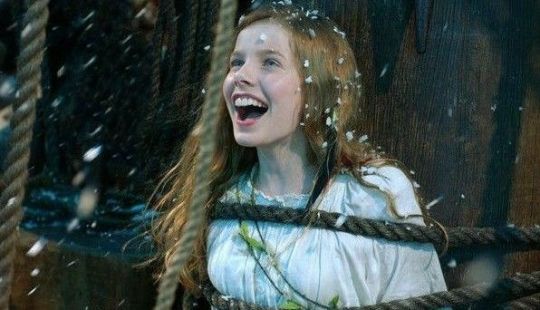
Rachel Hurd-Wood was the perfect cast for the role of Wendy Darling.I was actually surprised to learn that this was her first film role ever, because she was a natural. She effortlessly possessed the same caring nature and charm that makes Wendy so endearing. She is exactly how I imagine the character when I read the story. When people talk about Peter and Wendy, they always mention Tinkerbell, Pan or Hook, but personally I am always drawn to Wendy. She is the real heroine of the story. After all, she was the main reason for Peter to bring her and her brothers to Neverland.
What always amazes me about Wendy’s role in the story is the fact that Wendy literally doesn’t spend much time being a “child” in the time she spends in Neverland. When she’s not escaping death at the hands of mermaids or pirates, she acts as a mother to the ‘lost boys’ and her brothers. She asks herself what she really wants from life. In comparison, she was allowed to behave more like a child at home in Edwardian London. Neverland is not a place where you never grow up. It’s the place where she chooses to grow up. Many people have described Neverland as a manifestation of Wendy’s subconscious as a result of trauma, and I’ve never found that to be more true in this adaptation.
One of the reasons why I think P.J. Hogan’s Peter Pan is the best adaptation of the novel is the fact that the film revolves around Wendy’s coming of age. I loved that they expanded on her love of storytelling and also gave her a tomboyish streak. Instead of just being on the sidelines, she’s able to get involved and fight pirates while retaining many of her feminine traits such as her maternal instincts and romantic feelings for Peter. She makes mistakes and sometimes gets dragged into things she knows she shouldn’t do. But in the end, she triumphs.
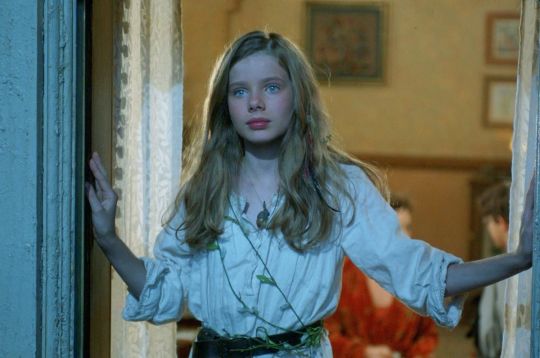
In many film adaptations of Peter and Wendy that I have seen, Wendy is either only present in passing or not at all. Characters like Peter Pan, Captain Hook and Tinkerbell always take centre stage, which I think is a strange decision as they are part of Wendy’s story and not the other way around. Peter Pan is meant to metaphorically represent the childhood she does not want to give up (which is why the character is always played by a woman in the original play, as he is a mirror image of Wendy). And Captain Hook (J.M.Barrie also wanted him to be played by the same actor as Mr Darling) represents the dark side of her father, or rather what she imagines adulthood to be. This is particularly emphasised in this film adaptation because he is an important factor in her being told to grow up. The father, the concept of adulthood, and Peter Pan, her childhood, are at constant war with each other.
“You’re not supposed to be like Peter, who kept every good and bad aspect of being a child and can’t tell right from wrong. You’re not supposed to be Hook, either. He let go of everything childish and loving about him and became bitter and evil..You’re supposed to fall in the middle, to hold onto the things about childhood that make it beautiful — the wonder, the imagination, the innocence — while still growing up and learning morality and responsibility. You’re not supposed to be Hook. You’re not supposed to be Peter Pan. You’re supposed to be Wendy Darling.” — @maybe-this-time
The 2023 film Peter Pan and Wendy took a different approach, by making Wendy a kind of powerhouse who always saved the day and outshone Peter Pan overall. In my opinion, the 2003 film adaptation emphasised very well that Wendy really is the yin and yang. She's allowed to be romantic, be rescued by others and at the same time determine her own destiny and stand up for herself. Because that’s what her journey in the adaptation is all about. She is pressured by all the adults in her life to grow up. She allows herself to be seduced with the prospect of an eternal childhood by Peter Pan. Then she realises that it is not self-fulfilling. She is tempted by Captain Hook with the concept of adulthood. And finally, she finds a balance between these two extremes on her own terms. By the end of the film, Wendy has made her peace with growing up while still remaining a child at heart. That requires a certain mental strength that we should all strive for.
Peter Pan and Wendy Darling
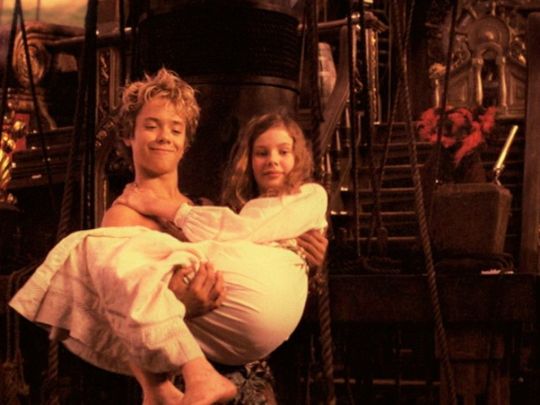
In most adaptations of Peter and Wendy, such as Hook and Syfy’s Neverland, the focus is on the title character Peter. In the more recent film adaptation Peter Pan and Wendy, the focus is on Wendy. This film adaptation of Peter and Wendy, on the other hand, sticks more closely to the original source material, as the story focuses on Peter and Wendy’s relationship. This is perhaps the reason why I always hesitate when I watch other adaptations, because these two characters are supposed to go together. It’s definitely a relationship that can be portrayed in all sorts of ways because they are symbolically the same person.
Although there is no romance between Peter and Wendy in either the original novel or the play, Wendy quickly develops romantic feelings for Peter which, as a prepubescent child, he does not consciously reciprocate as he has no concept of love other than that of a mother’s. Although Peter cares deeply for her, he ultimately only longs for her to be the maternal figure that is missing in his life. One could go into the symbolism that Peter and Wendy are one and the same, and that this is an expression of Wendy learning to love herself. But in a literal sense, J.M.Barrie had unintentionally created this very strong potential between the two characters. And I personally feel if your'e going to make an adaptation of Peter and Wendy that potential needs to be explored in some way, even if it’s not necessarily romantic.
Hogan recognised this potential and developed the romantic elements, e.g. ‘the “thimble” from the novel, into a very real and tangible plot. In other adaptations, Peter and Wendy’s relationship is rather one-sided. But in P.J. Hogan’s film adaptation, however, it is not at all. Over the course of the film, Peter and Wendy fall deeply in love with each other.
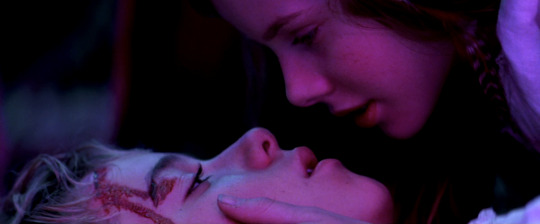
Rachel Hurd-Wood and Jeremy Sumpter had a remarkable on-screen chemistry for young actors, which helped give the adaptation its own identity. Whenever they interacted on screen as Peter and Wendy, it was — like the glittering pixie dust of Tinkerbell — simply magical. The off-screen chemistry between the two definitely helped make the romance so believable as well. When I was younger, I didn’t like romantic subplots in family films. I personally found that they clogged up the main plot because the “romance” tended to be very one-dimensional- but Peter and Wendy in the 2003 film version were simply enchanting.
In the original novel, J.M.Barrie alludes to the possibility of a romance between the two. In the film adaptation, they go all out. Their love story was written so beautifully and profoundly, while staying true to the original text and J.M.Barrie’s themes. This made the conflict hinted at in the novel of “staying in Neverland with Peter or growing up on Earth with Wendy” even more poignant and relevant, because in reality there was only ever one option. They couldn’t find a way to have both. That made the ending even more “heartbreaking” for me as a child, because even though they had the chance to be happy together, she couldn’t give up on growing up to stay. And he couldn’t give up being a child to leave, even though it was a natural progression for him.
Peter Pan
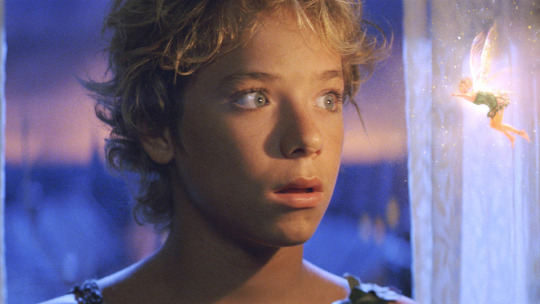
Jeremy Sumpter delivered a fantastic performance as Peter Pan. Not only did he perfectly match the illustrations, but he also managed to perfectly capture the essence of the charismatic, mischievous little boy from the novel. What’s more, of all the versions I have seen so far, he is by far the most accurate, right down to the clothes made of skeleton leaves, the dirty fingernails, the feral mannerisms, the traumatised soul behind the charm and the downright creepy insinuations. By today’s standards, you could almost take Peter Pan for a grown man who consciously decides not to behave like this.
However, when I watch the film again as an adult, I can now understand why he has reservations about growing up in Edwardian England and would rather remain a “child” in Neverland forever. As Peter says in the film, “Would they send me to school? And then to an office?” I feel like most of us today have so many choices as we get older, but back then it was much more limited. The choices were very restricted in that “heterosexist” environment. You could only be a certain thing, and it was much harder to hold on to the pleasures of life. I can now also understand the initial reactions of Michael and John to Peter: He must have seemed scandalous to people at the time. His bright colours, his inappropriate clothing and his behaviour are repulsive to the boys, but Wendy is immediately fascinated and attracted. I think it was a deliberate choice that he is the only character with an American accent to set him apart from the rest of the cast; to emphasise the wildness of the character and his non-conformity to the people of Edwardian London.
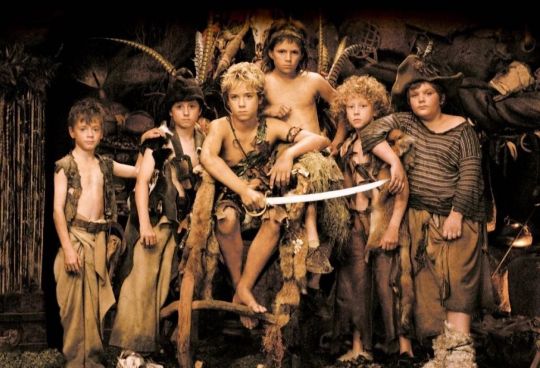
Another small aspect I liked was the suggestion that the Lost Boys, although they lived with Peter and obeyed his commands, lived in constant fear of him and did not worship him as in other adaptations. (A fear that is justified as Peter tries to kill them more than once in the film). What the 2003 film adaptation captured perfectly about Peter's character was: how terrible of a person he really is. Peter Pan is a hero when he goes on adventures and fights pirates. You could argue — via the quote “Leave Hook to me” (which Peter says to her in the film) — that Peter is Wendy’s split self who can fight her father (Captain Hook) for her, just like antibodies do with germs when we can’t handle them ourselves.
However, when it comes to understanding emotions, caring about others, even his henchmen, the Lost Boys, and doing anything that inconveniences him, Peter Pan is possibly as bad as Captain Hook. This makes Wendy’s decision to leave him all the more powerful. Although she was initially seduced by his adventurous life, she soon realises that his “life” of joy and adventure is not fulfilling at all. Because in reality, there is no real joy. There is no real adventure. In reality, his life is empty because it is not earned. In addition, she realises that she is gradually losing her memory of the outside world, including her parents - a sign that she is “slowly awakening from the dream”. This leads Wendy to realise that she wants more than what he can give her in Neverland (e.g. romantic love) and decides to leave. Being alive means feeling, accepting and growing. However, as long as Peter remains a boy, he can never truly be alive. Peter Pan conveyed this important message, whereas earlier film adaptations, including the Disney animation, did not.
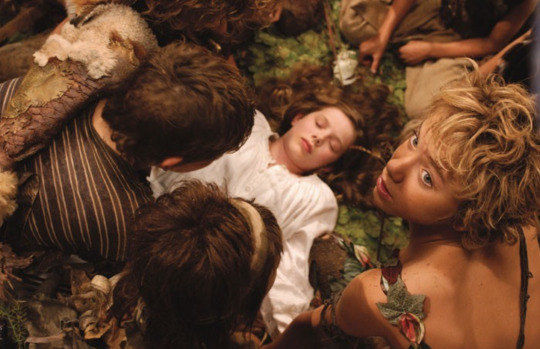
One of the reasons why good adaptations of Peter and Wendy are so hard to come by, especially in this day and age, is not only because they adapt a performative story that exists in layers of subtext. They also work with a protagonist who doesn’t change. Who doesn’t develop in any way, neither negatively nor positively. Not even just physically, but also mentally. (Even Eli from Let the Right One In, the child vampire, changes in the course of the story). At the end of day, Peter Pan is ultimately there to serve someone else’s story. It works in a fairy tale format. But it doesn’t usually translate very well to the screen because it often leads to one-dimensional storytelling. Even if it seems so natural, it doesn’t come naturally.
However, this adaptation allows Peter Pan to grow. The writers expanded on the small aspect from the book, which is the moment when Wendy enters Peter’s life; he begins to feel emotions. Not just love. But anger. Fear. Sadness. Pain. Disgust. And above all: self-awareness. Almost like a version of puberty in condensed time, as if the change suddenly caught up with his body. When Wendy brings this up, Peter immediately rejects it out of fear. I think most of us can all relate to this when we were in the midst of growing into a young adult. We experience feelings that are scary and new, that we can’t yet fully understand or even want to. For Peter Pan, falling in love is exactly what he is afraid of: growing up and no longer being a child. This adds to an interesting conflict that arises between the two when she asks him to leave with her.
“The thing about Peter Pan is, he’s a coward. Had the chance of a lifetime and he bottled it. Just fucked off back to Neverland. All alone, forever he was, by his own hand. Poor old Wendy, she had to grow old without him.” — Skins, 6x07 “Alo”
In the original novel, the reason Wendy can’t take Peter Pan with her (apart from the fact that he refuses to grow up) is the same reason Lyra in His Dark Materials can’t take Pan — the animal manifestation of her soul — on the boat to the land of the dead. She has to split in order to grow up and leave a part of herself behind. She can’t keep both in order to move on. But that does not mean I always agree with the ending either. In which Peter remains a child and takes Wendy’s future descendants to Neverland and back to look after him. It leaves an icky aftertaste, but at least it fits in with the story J.M. Barrie wanted to tell.

Even though the adaptation conveys the same message, that Peter Pan is the manifestation of Wendy’s youth, even to the end. In this version of Peter Pan, that is no longer the case. By the end of the film, the way he holds himself is different. The way he looks wistfully through the open window and solemnly says, “To live would be an awfully big adventure,” : a sign of self-awareness, while Wendy happily reunites with her family. So much so that Tinkerbell has to pull him by the hair to stop him from joining them and reconsidering his decision. Peter is now old enough to know that he loves Wendy. Maybe he’s also mature enough to know what he’s missing, but he knows he can’t have her the way he wants, so he does the most selfless thing he’s ever done in the whole film by letting her go.
There is no such conflict at the end of the 1953 Disney animated film. Peter Pan is described by Wendy as “wonderful”. In reality, everyone else gets their happy ending, except him, because he deliberately chooses not to. Peter Pan very much turns himself into a tragic figure because he is afraid of the most natural thing in the world. He is afraid of life. And I feel like this version of the story knew that and expressed it strongly, which makes me conflicted now as an adult. I’ve seen endings like this before, where two people fall in love but do not end up together because they grow apart or they are both interested in different things, and it’s very important to reach those points in different ways. It very much reflects real life and is also reminiscent of first love. How that love never really fades. It reminds you of simple times, even when you’ve grown up and moved on. That a part of you is still at that age when you look back on it. These endings happen because people grow — which Peter Pan does not.
“Peter in the books lives in oblivious tragedy. He may suspect that he’s not fully happy, but he tends to forget about it… yet this Peter doesn’t… Wendy leaving him and growing up to be a wife of another man is his unhappy thought…It’s the loss of innocence since Peter could not forget this…It’s the process of growing up…all but confirms that Peter’s character arc in the film is one of accepting the fact he too must grow up to be happy.” — @rex-shadao
And I think that’s the real reason why his character is both the strongest and the weakest part of the adaptation. The writers didn’t make it clear enough that Peter Pan forgets in their version of the character. In the novel, Peter Pan forgets everything automatically, which is why he can exist in this limbo of childhood and not go mad. However, as mentioned earlier, this version of Peter Pan is old enough to remember and, more importantly, to feel. Even though he is the closest to J.M. Barrie’s original vision, unlike his counterpart in the book, he is capable of evolving. That’s why the ending sometimes feels strange to me as an adult.
It was hard to say why I had a strange feeling at first, but I realised that a lot of my mixed feelings stemmed from having seen the film adaptation fresh after reading the novel. Since Peter Pan fully reciprocates Wendy’s love in this version, he ends up being a different character than in the book, which is why I now disagree with them keeping the original ending instead of having him grow up with Wendy. It would symbolise that childhood can co-exist with adulthood, that you don’t have to leave a part of yourself behind. That you can be your true and complete self if you find the balance between the two extremes.
The original ending still works however, in all its bittersweetness. I know what it means and understand what it stands for. Wendy basically says goodbye to her childhood and promises never to forget it. There’s a reason it made such an impression on me when I was younger. It could just be because I’m trying to pick up all the pieces of my broken heart from the floor. But personally, as an adult, I just find it weaker compared to the novel. Sometimes I like to imagine an ending to this version of the story where Peter Pan comes back, having quickly realised that he has outgrown Neverland, but doesn’t meet Wendy again until they are both much older, at a time when Wendy is coming to terms with womanhood and the idea of marriage. Or she even meets his real earth counterpart (if we were to delve into the psychology of Neverland being Wendy’s dream). And their relationship is subjected to the natural test of time and growth.
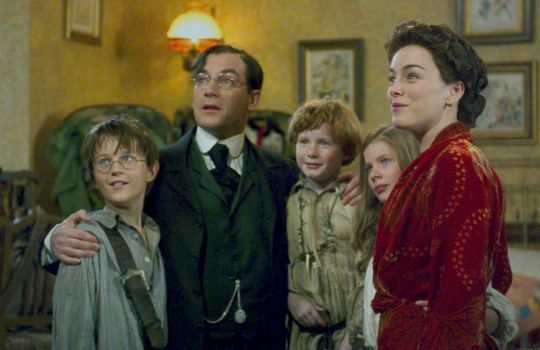
Peter Pan is an almost perfect adaptation. It matches the humour, the tone and the vision of J.M.Barrie. But I can certainly understand why the film didn’t do so well at the box office. In the month it was released, there was an unfair amount of competition, namely the film Lord of the Rings — The Return of the King. And as an adult, I can now understand why it’s not the film people think of or remember when it comes to Peter Pan adaptations. And it’s not just because it doesn’t fit the elfish, jolly trickster persona that Disney has created.
The film adaptation suffers more from what it doesn’t do — such as maintaining a stable tone and consistent editing — than from what it does. It’s one of those films that would have benefited from being much longer. That way, the inconsistent tone and some of the rushed parts of the adaptation would be much more balanced. It feels like it was missing an extra twenty minutes. For example, the film is narrated by an older version of Wendy, but without the deleted ending where it becomes properly clear that it’s her telling the story to tie everything together, the ending feels a little abrupt. Say what you will about Tim Burton’s adaptation of the Series of Unfortunate Events, but the audience could see where the film’s narration was coming from the whole time. I think if they knew the alternate ending wasn’t going to work (that scene is a classic example of something working well in the novel but not in the film), they should have removed the narrator altogether with the deleted ending and adjusted the film accordingly. They should have extended some scenes so that parts of the film weren’t rushed, such as the introduction, and the story would have been left more up to interpretation as there was no voiceover throughout.
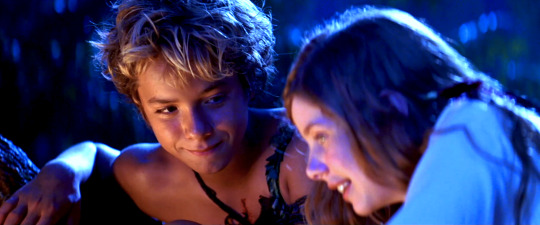
Despite its weaknesses, P.J.Hogan’s Peter Pan is still an underrated masterpiece 20 years later. It is an irresistible film that captivates and warms the heart. The film adaptation has certainly stood the test of time, staying true to the original while adding its own flavour to the story. It is full of magic, wonder and heart. It was clearly made by people who loved the origins of the story and explored where they came from, while also digging deep into the text to reshape the character arcs in a fresh and meaningful way. They succeed in capturing J.M.Barrie’s original message, which is that growing up is a natural progression of life, but that doesn’t mean leaving childhood behind entirely. That it is important to maintain a healthy balance between the two: Taking responsibility while appreciating the joys of life. From the vibrant colour palette to the goosebump-inducing music to the solid performances and gorgeous chemistry between Jeremy Sumpter and Rachel Hurd-Wood, my love for this adaptation will never end, no matter how old I am.
#peter pan#peter pan 2003#jason isaacs#jeremy sumpter#rachel hurd wood#peter and wendy#j.m barrie#peter x wendy#wendy darling#analysis#tinkerbell#captain hook#disney#peter pan and wendy#disney +#hook#James Newton Howard#olivia williams#novel#classic literature#filmmaking#film#cinema#culture#movie review#darling pan#finding neverland#film review#peter pan (2003)#peter pan live action
408 notes
·
View notes
Text
Things I liked about the Netflix ATLA and some critiques:
Before you read. Please go watch the series, take off your blinders and keep an open mind. It’s surprisingly good. This review has spoilers.
They reordered some scenes so that emotional moments would have a larger pay off. Like getting to see and experience Aang’s relationship with Monk Gyatsu, and seeing his tribe before it was destroyed. So when he has his breakdown in the air temple with Sokka and Katara later, you really feel and understand his agony.
Azula is introduced earlier, with a story running simultaneously with the Aang’s journey but not involved with his. So she has a chance to be more fleshed out and explored before she becomes a major threat. Only time will tell if this more complicated Azula comes close to the animated one. Big shoes to fill, but not a bad start.
Fire Lord Ozai plays a more sinister and oppressive role. Not a faceless boogeyman anymore. You get to see his machinations and the cruel games he’s playing with his family, and see the emotional abuse that warps them.
Appa is adorable as fuck, and so is Momo. So well animated, such gorgeous care put into them.
Kyoshi, Kuruk, and Roku make more of an appearance. With Kyoshi narrating the prologue. And if you loved the novels you’ll see they incorporated more of Kyoshi and Kuruk’s backstory from the novels than what we saw in the animated cartoon.
The acting was competent, even if a little wonky at times. I found Sokka very endearing, I loved the kid they cast as Aang and you can tell they really tried to find a balance between serious and playful. They didn’t always hit it, but the effort was there.
Zuko was great. I think they nailed him and he had great chemistry with the actor playing Iroh.
King Bumi was great, I love how they made his internal struggles more complex. He wasn’t just a crazy old man anymore. He was a crazy old man who was weary and worn down by the horrors of loss and war. A crazy old man who struggled to reconcile that the best friend he lost is the avatar and wasn’t there for him.
I loved the costume and set design. It was like stepping into the actual world of ATLA. Cities were complex and well constructed. Every setting was incredible and the attention to detail was intense.
Zuko’s boat is full of artifacts he pilfered from the Air Nomads while hunting for the avatar.
They changed how Aang got the bison whistle so it makes more sense and fits more seamlessly into the story. It never made sense why a random peddler would be selling a bison whistle if air nomads and bison have been gone for 100 years. Not impossible for a peddler to do, but not probable. The Netflix series actually gave more meaning for the artifact and changed how Aang received it.
Emotional points in the show are now more intense and brought me to tears.
Commander Zhao is more competent and conniving, and his presence felt more dangerous and less comedic.
Sokka’s outright sexism was changed from putting girls down, to just manly machismo, talking himself up. Not gone, but not degrading. They decided to let the sexism message shine more prominently with the northern water tribe, rather than tackle it twice with Sokka too. (Sokka’s sexism being solved in one episode was never well written to begin with. And the animated series quickly forgot about it and moved on to him tackling more important issues, like his being a non bender inadequacy, his leadership journey, his physical combat journey, and him finding himself as more than just the funny sarcastic guy.) For time constraints, it was better the Netflix series did not to tackle the same problem twice, especially when you might not have the resources to give both sexism issues the gravity it deserves. By focusing the sexism problem to the northern water tribe they were able to give Katara more attention.
We got to see Katara’s water-bending go from being ultra sloppy and weak to badass. It feels like they are spending more time focusing on her developing into a warrior rather than being the mom of the group. I’m honestly not sad about it. She’s still the hope ridden, emotional glue, but now it feels like she explores that warrior side a little deeper. It felt so earned when she got the title of master at the northern water tribe finale.
The actor playing uncle Iroh nailed the role. I couldn’t think of a better live action adaptation of Iroh. I love him so much.
The shirshu looks fucking phemonal.
Koh was scary as fuck and I love it. They really nailed his horror elements. Even if I’m a little sad that they changed some things about his face stealing. (He eats faces now to steal them, rather than stealing when someone shows emotion.)
The three actresses who play Mei, Azula and Tailee actually look appropriate for their age. Since they are introduced earlier, they are clearly younger, and since this show is intended to get more seasons, the casting choice made sense as we are intended to watch these girls grow up over the course of the entire show. These actors will get older, and the characters will get more menacing and sharper. It’s great. It’s thoughtful. I love it.
We get to see Zuko’s dynamics with his crew more. And find out that he did more than just speak out against his father at that meeting. His outburst at that meeting saved an entire squad of soldiers, and they don’t even know it. Zuko feels such disdain and bitterness because of the situation, and his crew doesn’t even know why. It’s so complex, you can see how the abuse Zuko endured causes him to take out his anger on his crew, and in turn they are bitter back. And it’s this cycle, that festers. But the crew also grows with Zuko, they change and evolve as he evolves. And it’s such a delight to watch.
They could have cut the Secret Tunnel minstrels altogether, given the time constraints and that the episode was mostly fluff in season two. A fun romp, but not necessary. But the creators knew people loved the minstrels so they found a way to use them anyway. Because they knew they were special. I am thankful for that, even if they show up waaay earlier than they should.
I was honestly more sold on Sokka and Suki’s relationship in the live action. It’s was so adorkable. Do I wish it had more time to develop? Yeah, of course I love a good slow burn. But that didn’t mean it wasn’t fun as hell watching the two flirt so badly with each other. Sokka being a buffoon, and Suki overstepping and being too rough, before realizing she was being too hard.
Some Critiques:
They reordered some episode storylines to happen at the same time, and while it does bloat some episodes. it’s understandable due the episode and budget limitations. In the cartoon, during the inventor episode Katara didn’t have a lot to do, and during the freedom fighters episode Sokka didn’t have a lot to do. So they ended up combining both stories into one hour long episode in the live action, so that both Katara and Sokka would be involved in something. Is it the best? No. But it makes sense. I get it.
Katara starts off bland in the first episode and it takes a bit for her to grow into the character.
The past avatars can be a bit strong with the doom and gloom, and I wish they’d toned that back.
Koh and Heibei (I dunno how to spell the panda spirit’s name) got combined to the same episode, and Koh stole Heibei’s spotlight. Again, I understand why these got combined, but I think it could have been handled a little better and Heibei should have gotten more closure.
There should have been a ninth episode, placed between the two episode Koh storyline, and the Northern Water Tribe storyline. Why? Because the Koh storyline was really heavy and intense. And it leads right into the season finale. An extra ninth episode should have been added with a more lighthearted tone. Something to ease the tension between the two very intense storylines.
Aang should have been using a glider to flit about the temples in the first episode. But it’s not something that ruins the whole show. It was a dumb that only happens in a single episode in the season.
I really missed Momo and Appa’s presence. They appeared atleast once in every episode, but it was still sad they weren’t more of a presence. Again I understand why. They were so beautifully animated that everytime they were on screen it (without a doubt) cost the production thousands of dollars. They were generous including as many of the unique animals and creatures as they had.
I still don’t think Sokka had enough time to develop a relationship with Yue at the northern water tribe. It was rushed and contrived in the animated version, and it was rushed and contrived in this Netflix version. There also wasn’t any of the chemistry like Sokka had with Suki to make the whirlwind romance work. I never liked the romance from the original, and I wasn’t a fan of it here. But that’s ok, because it’s such a small and insignificant thing.
In conclusion most of the changes I can see made were due to budget, and episode limitations. The creators were clearly trying to bring theater-cinematic quality to what was essentially an eight hour long film. And you cannot deny that this show is stunning. Absolutely breathtaking. Most of the episodes cut were filler, and while hilarious and mostly loved by fans, were stories not as necessary in the grand scope. You could feel the love and appreciation the creators included in this series. It wasn’t soulless, it wasn’t a heartless cash grab, it wasn’t a shot for shot (thank god) but it also didn’t butcher the source material.
I understand that the animated show creators had creative differences with the live action Netflix adaptation creators. But that doesn’t mean that the Netflix series completely failed. As every fanfic writer out there knows, the original authors are not going to love what you create based on their works. Tolkien hated every adaptation of his works, HATED them. But no one is going about saying that the Lord of the Rings trilogy movies were hot garbage. A creator doesn’t have to endorse a project for it to be good.
Netflix ATLA is good, it’s not perfect. And it never was going to be perfect. The cartoon it was based on wasn’t perfect either. But the ATLA cartoon was definitely some huge shoes to fill that set a bar very high. Any adaptation was going to struggle to be just as good.
I think the Netflix adaptation was a treat and a pleasure to watch. I think people should go into it with an open mind and see that it’s not trying to replace the cartoon. It’s a love letter to the cartoon.
PS: According to behind the scenes commentary on the Nickelodeon ATLA cartoon, the reason we didn’t get a season 4 was because the creators wanted a live action film. Nickelodeon offered the original cartoon creators the option to make season 4 or to spend the budget meant for season four on a live action ATLA film. The original creators chose the live action film directed by M. Night Shamalan. They wanted a live action for their show over a 4th season. They had no idea M. night would butcher their baby with his pathetic film all those years ago.
This show was a second chance after the M. night abomination. And you know what? It’s a pretty decent adaptation. And guess what? With a resurgence of interest in the series, we are getting more animated content for the original animated series. There’s definitely something for everyone on the horizon if this succeeds.
#netflix atla#avatar the last airbender#atla#live action adaptation#live action avatar#review#my thoughts#positive#loved it#it was great#go watch it#recommendation#pros and cons#a thoughtful and positive breakdown from someone who is generally picky and pessimistic about adaptations#spoilers#many spoilers
361 notes
·
View notes
Text
I'm tired of being disappointed. By far the best part of the movie was the what-could-have-been in the soundtrack. Mufasa had seeds of being good but it suffered from a lack of focus and terrible visual language, so it was ultimately unsatisfying.
I think it's actually worse when you can see the threads and interesting seeds of a good story just wasted and abandoned under a pile of Bad Storytelling.
Lack of Focus:
The movie was trying to say something about Bravery, and Bloodlines, and Vengeance, and Going Against the Status Quo, and Self-Reflection, and Loyalty, and Family, and Relying on One Another Instead of Just Yourself, and Belief in Yourself, and even Vague Spirituality, all at once. So it wound up giving the movie-equivalent of two or three disjointed sentences about each topic, and never actually made a clear point about any of them.

For example, Mufasa is afraid of water. Rafiki says that this is because Mufasa is afraid of his own reflection, even though the audience would have been assuming that it was because Mufasa almost drowned as a cub. Then in the climax, Mufasa and Kiros are battling underwater and Mufasa remembers his foster-mother telling him to close his eyes and use his other senses to hunt. So he does, and he realizes I guess through the currents, that a big rock is falling toward them, and pushes Kiros into it.
What does that tell us? That Mufasa was taught to hunt like a lioness, so he can use those skills when he needs to. Which he's already been doing with no hesitation for the whole movie. Just because he's in water during the final battle, doesn't mean that's a satisfying conclusion to what they were doing with water, as a symbol for his character.
IF Mufasa had been embarrassed about his lioness-observational-skills, thinking it made him less of a lion, or weird, and therefore rarely used those skills because he was always trying to be more like Taka or the other males—conserving energy, not being mindful of what's around him—THEN finally embraced his weird skills at the end, while in water fighting—that would be something thematic.
You would be able to say, "he's learned not to be afraid of where his skill-set is, as a leader, ergo: he's learned 'not to be afraid of his reflection/the water.'"
But that's not what happened. Because they didn't devote time to developing what, exactly, Mufasa is afraid of seeing in himself, or WHY he's afraid. Because everything he does succeeds. He wins his first race, wins his first fight, wins the favor of his adoptive father, survives diving into water even though he's afraid of it, wins at saving sarabi and then wins her affections even when he's actively trying not to—there's no reason for him to be trying not to. Not any that tie back into "Mufasa is afraid of himself." There's no reason ever shown for this weird halfhearted insecurity he sometimes has, and has to overcome.
So then it's not compelling. And that sort of thing is sprinkled all over the movie.
They keep mentioning "Milele," which means "forever" in Swahili, but that whole concept is alternately described as a "dream," or "a place you feel inside of you," but basically it's also a physical location that becomes the Pridelands. And nobody ever clarifies what exactly Milele is. It's treated like a fantasy concept or a spiritual vision or a physical utopia whenever the film needs it to be those things. But if it's never clearly defined, it's not compelling, which sucks when Milele is what the characters are "searching for." Another example of starting a concept and then never following it through to a satisfying conclusion.
They have seeds of Mufasa being the only lion to ask for help and be willing to cooperate with other animals besides lions—but they are few and far-between. He doesn't ask Rafiki for help; Rafiki sort of convinces him not to eat him. And asking animals for help like he does with the elephants or the Pridelands animals isn't unique to him; the first to do it is Sarabi, who willingly accepts and relies on Zazu despite others' scorn—and MUFASA is one of the ones who is scornful, initially! So they plant seeds for the big climax where he's the only voice that can unite animals across species by the climax, but they're don't water or tend to or help those seeds to grow. So the climax feels a little out of nowhere and less compelling.

If they had just focused on one of these things, it would've been tighter and more emotionally impactful.
Except NO, it wouldn't have been. Because you will have a hard time connecting, emotionally, to photorealistic-CGI lions even if the story's focus was tight.
Bad Animation and Filming

Lions in real life move with too much weightiness and heavy-animal-breathing for you to commit to that weight 100% of the time AND have good character acting. You can only really commit wholeheartedly to one or the other.
So you can tell in this movie the eyes are bigger and more expressive than in the first CGI Lion King. But that doesn't save it. It doesn't cut it.
When Taka is giving Sarabi his last longing look, he just looks like a vaguely displeased large animal. There's no human heartbreak in his expression.
When Mufasa is singing a fast line about not knowing how to respond to Sarabi, he should be swinging his head back and forth, like he's looking around for something in desperation—because that's what the song sounds like—and his walking, if he's walking, should be fast. A cross between running from something and searching for something. Because that's what's happening in the emotion of the song.
But lions don't move that fast, because they're heavy. And when they're looking around for something, they do it with their noses and long head-turns in sweeping motions. No fast eyes-darting-around. Certainly no human conflict of desire in their faces. So photorealistic Mufasa can't do any of those things. Which sucks, because the actions of the characters and the action in the scene should match the emotions they're feeling, and the emotion the audience is supposed to be feeling. But it can't, so everything is flat and boring.
And even if you could connect to photorealistically emotional lions—you might, we connect with our pets emotionally all the time—you wouldn't get the chance because the film avoids their faces every time something emotionally interesting is happening.
For example: my favorite part of the song "I Always Wanted a Brother" is when the beat appears to hard-drive, and it feels like a "stop everything" moment, to match Taka's outrage that someone is dissing his brother. And he goes, "what did you say 'bout my brother? That's not a stray, that's my brother! You stay away from my brother 'cuz I say so."
That whole moment, I'm envisioning Taka getting all up in another animal's face, maybe taking a swipe at it, throwing his little weight around and puffing his chest, fearsome-face. The song FEELS like that's what's happening; like he's going on and on, exploding with insistence and protectiveness.
Something similar to the "stop everything-angry" vibe of this:

But in the movie, is it a close-up shot of Taka invading another animal's space? Does the camera follow him from behind in a slow zoom, and then when he says, "what did you say bout my brother?" He spins and looks directly into the camera (in the direction of the animal he's talking to) and the camera stops while Taka charges closer? Do we get to see his angry face at all?
No.
The camera does this stupid boring thing where we, the audience, are in the branches of a tree (where the animal Taka is addressing is safely out of reach) and it pans slowly along, unfocused, like we're casually passing this interaction by. Taka's face is far away on the distant ground and you can't really see it's expression, his body language isn't doing anything interesting (he's just standing there for the whole part of the song) and at one point because of the panning, the tree the camera is in has a branch that actually hides Taka completely from view during the song.
We don't even get to see the animal he's talking to react. All we see is the back of its head.

They do this over and over in the movie. When Rafiki is finally running to meet his long lost brother, we get the back of his body, one quick snapshot of the underside of his face, and then it's flyover drone-style shots. When Sarabi and Mufasa decide to love each other, it's a close-up on the backs of their chins; no eyes, no mouths, no head-body-language. When Sarabi and Mufasa are singing a very back-and-forth interactive duet to one another, the camera is, again, far-off and distant for most of the song, rotating slowly around a landscape that they're lion-lumbering through. Boring. Distant. Wasteful.
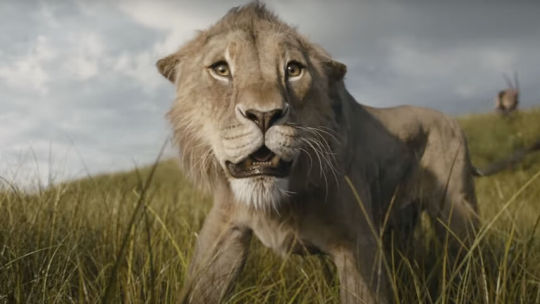
Sometimes the movie tries to match the emotional pace in the way it's shot. When Kiros is readying a killing blow and Taka has moments to decide if he's going to save his brother, that scene cuts well between the raised paw and Taka and Mufasa's faces—for example. But those are the most basic ways to shoot those scenes, and scenes like them are few and far-between.
What it needed was one overarching idea to connect the character threads, and give them time to unspool. And then it really, desperately needed to be animated traditionally so that the lions could emote like humans.
So! I'll probably be writing a series of posts exploring what could've been to correct the fumble. Because I did enjoy the concepts in Mufasa.
#Mufasa#the lion king#kiros#obasi#afia#eshe#Taka#scar#tlk#meta#character analysis#storytelling#filmmaking#film#cgi#animation#visual storytelling#lions#disney#critique#live action remake#live action lion king#review#2024 movies#Mufasa 2024#James earl jones
76 notes
·
View notes
Text
OK OK I FINISHED BINGING THE ENTIRETY OF NATLA AND I GOTTA SAY IT WAS A GREAT ADAPTATION!!!
Here are my thoughts so far:
The parts where I still had my reservations for the first half were definitely addressed in the second. There were more Kataang beats, especially in the last three episodes.
Please that whole part before the zutara showdown where Aang goes like "go easy, enough ppl have suffered" and zuko is more or less like "lol it's cute u think i'd hold back" and then aang has this proud little smirk like "oh i wasn’t talking to you"😏 Also his proud little smirk when Katara is fighting Pakku PLEASE HE IS GOING TO BE THE PROUDEST BF
They covered the most important points and had a decent few scenes of fan service, loved that.
However, the adaptation is not perfect and there are definitely parts that were lacking, at least to me. Primarily, I think they did our girl Katara a little dirty not emphasizing as much on her arc as opposed to Sokka's, for example, and also the way her ascension to master was pretty telly instead of showy
There was definitely something to love in every episode, but I think the weakest ones have to be Omashu and Spirited Away.
My ABSOULUTE FAVORITE episodes were Into the Dark and Masks. Dallas, Paul, and Gordon did SUCH a great job in them. I cannot WAIT for the proper leaves from the vine scene and also to have more of zuko interacting with aang.
ZUKO IS BABY BOY AND DOES NOT KNOW ANYTHING NOT EVEN ABCs 🥺🥺🥺
My favorite was Zuko by far, yes. I think the performance and the was he was written struck the best balance of that goofiness and tragedy atla is originally known for. That’s not to say the other kids didn't do a good job, but Dallas' Zuko was by far the best imo
I understand now what the showrunners meant by making the show more mature and serious. I cannot say I didn't like it, but I can see it being an acquired taste especially for the part of the fandom that is more purist/demanding. I like that the focus emphasized more on the consequences of war and that it reflected on the cycles of violence and hurt, what they do to a person and how the wounds pass down generationally. I think this emphasis on war, compassion, kindness, all those things are definitely an important message in this time and day. However, it is a little too serious for my taste, PRECISELY because of the times we are living in. Back when the OG came about the world was in a time of relative peace. But now we get pictures of carnage and genocide mixed in with videos of cute puppies, so it's definitely a different place. It was much easier to understand the gravity of the genocidal/bombing scenes imo, almost to a point that they seemed watered down/kid friendly compared to the real thing that we see on our phones everyday. Because of that, I think erring more on the comedy, the balance between what it ACTUALLY means to be hopeful and not just talking about it, is the one thing the show could improve upon for next seasons.
All in all I am VERY pleased with the adaptation. There were moments where I definitely bawled my eyes out, shouted, and laughed the same way I did the first time I watched the show. All I can say is, for those still on the fence about watching it, so long as you go in with an open mind and with the explicit objective of enjoying yourself, it will be a fun watch.
#natla#atla#natla spoilers#atla spoilers#aang#katara#sokka#zuko#kataang#zutara#sukka#suki#uncle iroh#natla review#avatar the last airbender#avatar the last airbender live action#atla live action
304 notes
·
View notes
Text
My overall thoughts on the Netflix Avatar Show.
...I liked it. :)
I totally get the changes, and honestly, I don't see why everyone is so butthurt about it. I really hope it has a second season, cause I want to see Toph.
I'm just really baffled at some of these people being so unprofessional about this adaptation, like DiscussingFilm on Twitter...it's like, what do you know, dumbass? It does have the spirit of Avatar. It's its own thing, yet it has the spirit of Avatar.
Like...what did you expect?
No one was complaining about the One Piece live-action and only saying how good it was. So...what's the deal here? Is it some of these brain-dead so-called 'fans' saying that it doesn't have Byrke's approval? Like, get over yourself.
Sometimes I can't stand the Avatar fandom...
But really, I hope this gets a second season. I want to see how they handle Toph.
Netflix, PLEASE, greenlit this bad boy! I want to see more! :O
But yeah, I enjoyed it. It had great moments and the changes made sense, and the characters were amazing as usual.
It's not perfect, but I sincerely think it was a pretty good adaptation of a beloved cartoon...definitely better than that live-action Avatar movie that shall not be named. XP
I give it an 8.5/10. :)
Go watch it folks! It's good!! :O
300 notes
·
View notes
Text
I watched the Netflix adaptation of ATLA today and being a hardcore fan of the OG series who knows every nook and cranny of the ATLA world, here’s my unbiased and truly honest review (It contains both the negatives and positives of the series, so dear reader please enter to read at your own risk).
Firstly, let’s talk about the wonderful additions to the already magical world of ATLA.
1. The depth of the genocide
Well, I always wanted to know how the air nomads were suddenly wiped out and how it would have been for them? Why didn’t they resist? I got my answers in the first episode where we explore how the unhinged power of the comet was “actually” used to create a genocide on a massive level. Before that, I had only heard about it in the OG series. Those few scenes were so powerful that they had left me sobbing uncontrollably and Gyatso’s concern regarding Aang had me bawling.
2. Suki’s Characterization
In the OG series, we do find our Suki the fiercest warrior, but here in the live action, she’s an absolute goddess. She is perfect in every sense. She understands the responsibilities she has being a non-bender and is fearless. Her character is what I believe to be was the strongest one of all.
3. Graphics & Music
We never talk about a film by M.Night (that didn’t happen), but this one is really a visual treat for you can readily set yourself up for some mind-blowing bending scenes, plus the fight scenes are quite impressive. It seems that the VFX team had really done their homework this time. Plus, both Momo and Appa are so freaking cute. I loved the fluffy Appa. Good work over there. The revival of the OG theme is also a highlight plus the sun warriors’ chanting in the end is given a new but intriguing twist. The background music especially in scenes where Aang unravels his Avatar powers is mystical in every aspect.
4. Life in motion
I don’t know about others, but I have always been a sucker for animation as well as live-action where characters are operating even in the direst of the circumstances. Life is there and even after they know what happened a hundred years ago, they are still trying to believe and regain their past confidence. This is beautifully portrayed and I was very much impressed by the way people are continuing their day-to-day activities even in the middle of a crisis.
Overall, the series serves the purpose of an adaptation carrying its unique colors (at least better than the previous live-action disaster that didn’t happen).
Now let’s move to the bad side, and when I say it’s honestly what I felt, you need to take my word on it being a hardcore Atla fan.
1. Weak writing & lots of exposition
ATLA remains at a 9.2 IMDB rating even after years because of its writing, strong plot, and very few plot holes. This time, the writers are the real amateur ones. Despite adding more to the already flourishing universe of ATLA, sadly, they killed the quest of the viewer to find answers. There is too much exposition. It seems that every character just wants to see the end of the war and keeps on revealing things after things. Plus, some of the OG moments that were the soul of the series are not even included. The way Aang finds Momo and then decides to keep it with him as a last remnant of their bygone air nomad civilization is nowhere to be found. In fact, the replacement of Roku with Kyoshi is the biggest disappointment. I love Kyoshi like no one else but that was unnecessary as per the cycle.
2. Bland acting
Even the worst writing shots can be digested only if the acting appears real good. Sadly, this is another issue that I found with the NETFLIXED version. No doubt the characters must have done a lot of hard work for this, yet, they lack the expressive power. Gordon as Aang is super cute but the goofiness is not even there. Katara seems a nerd who doesn’t like to talk much even when it’s necessary and Sokka’s jokes are forced. Meanwhile, Dallas seems to save the day at one point, but again his over-the-top angry young man attitude ruins it for me. Maybe the actors will learn from the criticism in the upcoming season (if Netflix plans to go with it).
3. Major changes
Yes, it’s okay to change the narrative while you are working on an adaptation, but targeting the loyal viewers who are OG fans of ATLA means that you have to be very careful when you are trying to implement your changes in scenes that are the real soul of the OG. You can’t change the Omashu myth as if it’s nothing when we actually see even the cute animated version of the folklore. You cannot portray Roku more as a perpetrator of the genocide and Bumi as the evil king when in truth he’s the mad king who’s known for his genius ways of teaching. I hated that. Plus, reducing Zhao’s authority and taking Uncle Iroh’s sarcastic attitude is just meh. Mai again doesn’t even seem perfect as a cast. Jet is good as far as the aesthetics are concerned but Jet being in Omashu doesn’t even sit right with me. The amalgamation of multiple storylines creates so much confusion and this persists till the end.
4. Bending at convenience
We all know how Katara’s bending progressed throughout the first season and it’s little effort each day. However, in series, one day she’s unable to bend even a droplet of water and the next day she is capable of producing ice crystals. This was unacceptable for me because I was anticipating her learning strategies. Besides, Aang doesn’t learn much water bending throughout this season and in the end, it’s him being the savior in Avatar state. Thoughtless bending sucks despite the great VFX and that’s one thing at which you can’t convince me otherwise.
5. Forced friendships
We all know how it took some time for Sokka to embrace Aang as a chum. However, here Sokka keeps on calling him “the kid” and remains mostly alienated from Aang. Talking to Katara, then she also seems more interested in helping Avatar fulfill his goal than being with a friend. I hated the scene where Aang comes into the Avatar state and instead of hugging him just like in the OG series, Katara runs along Sokka and keeps on calling his name. How is that going to build any organic friendship? I think the first mistake began right from the very moment when Aang was taken back to Wolf Cove on a boat in his unconscious state. Upon opening his eyes, the first person he finds near him is neither Katara nor Sokka but a tribesman who’s playing guessing games. Writers were really high when they wrote that.
6. Lack of the four nations’ biodiversity
Maybe in live action, it’s difficult to create all the marvels of the four nations when we talk about their natural biodiversity. In the OG series, it is indicated by Aang that even after 112 years, he has still not forgotten the animals that define different regions in the four kingdoms and that’s exactly why he wants to finish those “important tasks” alongside saving the world. His important tasks included keeping a check on the natural biodiversity of the lands and exploring whether the Hundred Years’ War had not damaged the majestic animals. Actually, his first dialogue right after regaining consciousness is to go for an otter penguin’s ride with Katara. When I thought about that I felt that somewhere in Aang’s mind he was always connected to nature and that’s why he wanted to regain that connection by being an avatar. Sadly we never see much of the biodiversity but I hoped that maybe they will.
Also, how come Aang had that silent whistle for one hundred years when in the series he only discovers that accidentally? I missed the OG Yip Yip for our Appa. There are lots and lots of problems with the Netflix version, and no I am not being a nitpicker. I appreciate how the current creators credited the original ones, but now I know why Bryan and Michael bade farewell to this project. On a scale of 10, it’s a 4 for me or 4.5 if I am being too generous.
If I am asked to review the live action in a single line, I would only say this:
“The Netflixed ATLA makes you go back to the OG series and you end up watching the animation to give your mind a much-needed respite from a carefully crafted artistic disaster aimed at the sensationalized generation.”
#atla#avatar the last airbender#atla live action#atla netflix#avatar aang#atla katara#avatar zuko#avatar roku#avatar the legend of aang#iroh & zuko#zutara atla#kataang#avatar canon#avatar review
165 notes
·
View notes
Text
So... Apparently UA s4 is a massive flop.... I'm not saying we need to start bullying* showrunners and writers and networks/streamers (*putting pressure on them to do right by beloved pieces of media with passionate fan bases so much so that they feel they'll get the guillotine if they do anything less than perfect and justice by the story/characters) but.... We need to start bullying showrunners and writers and networks/streamers again. These mfs have gotten too comfortable
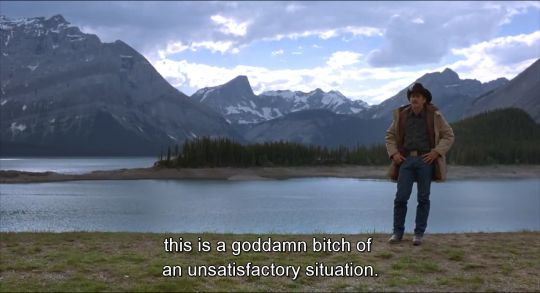
#I haven't even watched it bc I wasnt caught up with s3 but I just saw the reviews before I started#Seeing mutuals go wtf and was like yeah some shit def went down in this season but holy shit. They apparently just gave up entirely#Like literally just bc you do a decent job with one season doesn't mean you're off the hook... Keep that energy#Also everyone knew Netflix didn't want them to have another season but was basically forced by s3's numbers to do so#Bc they gave it 0 promo instead promoting ST the whole time which didn't need it so ppl forgot and then#Only giving it 6 eps and the fast turnaround considering the long strikes and writing period... It was doomed from the start#Uatv#Anyway! Embarrassing.#Good job! You blew it!#Ua#the umbrella academy#Umbrella academy#wow anna said something#anna's shitposts#We need to give them the one piece /cowboy bebop live action treatment.... Make them afraid to fuck up
106 notes
·
View notes
Text
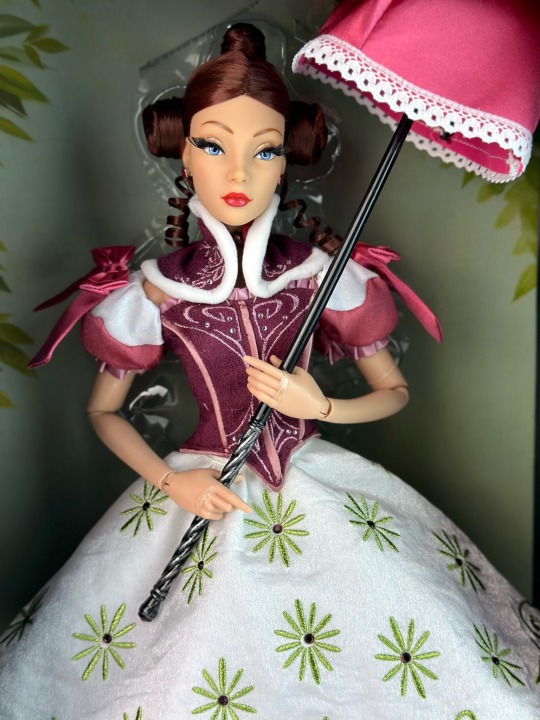
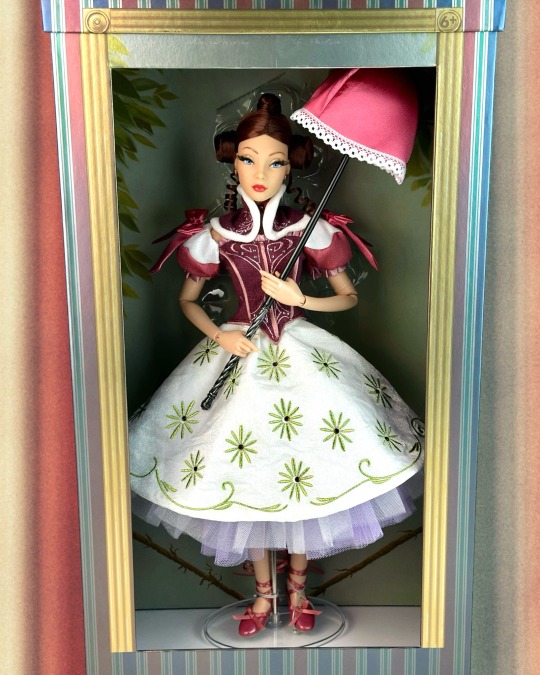
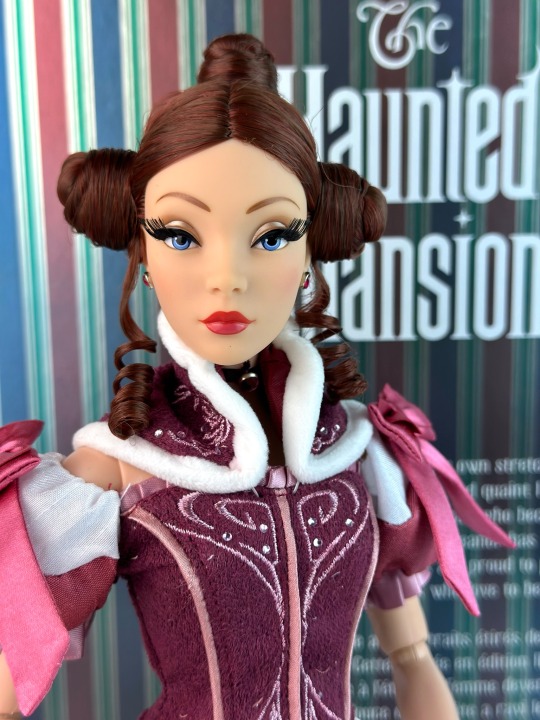
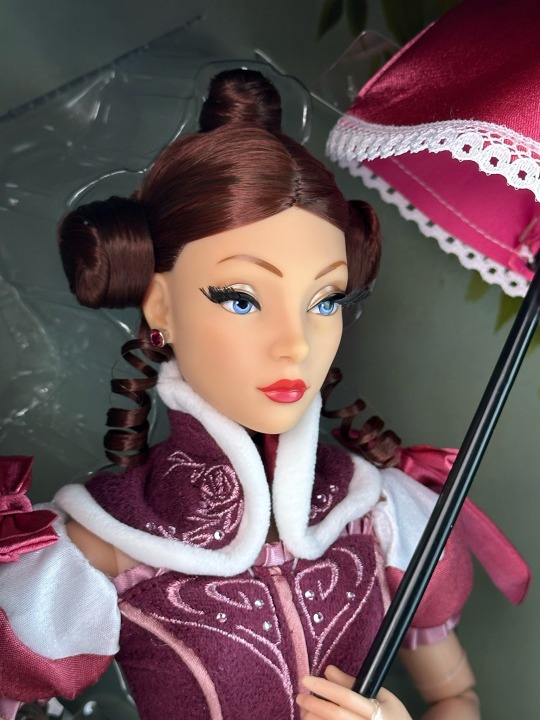

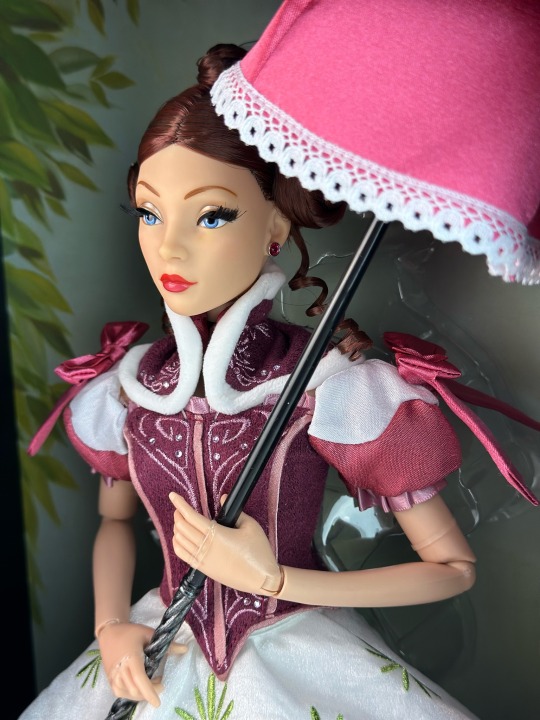
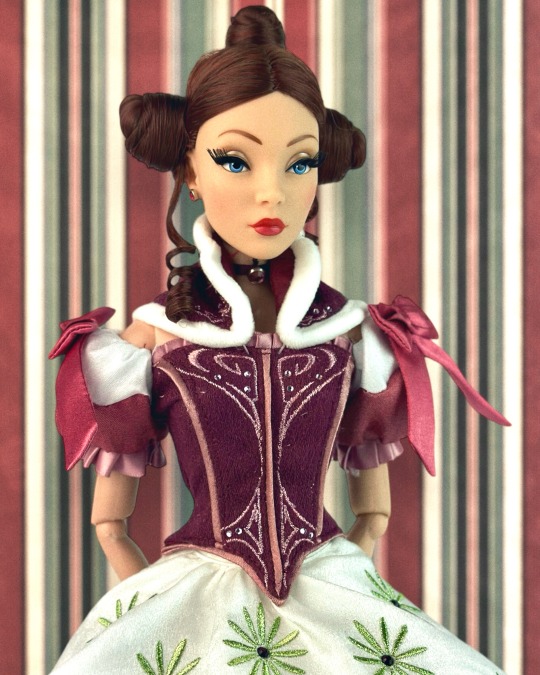
In the swamp, poor Sally Slater was eaten by an alligator” 🐊 Review for this beautiful new haunted mansion doll is available on my YouTube ☂️
youtube
#disney#haunted mansion#the haunted mansion#Sally slater#disney live action#Disney limited edition doll#Disney dolls#Disney doll review#Disney land#Disney world#Disney parks#Disney rides#Shopdisney#Disney store#Youtube
72 notes
·
View notes